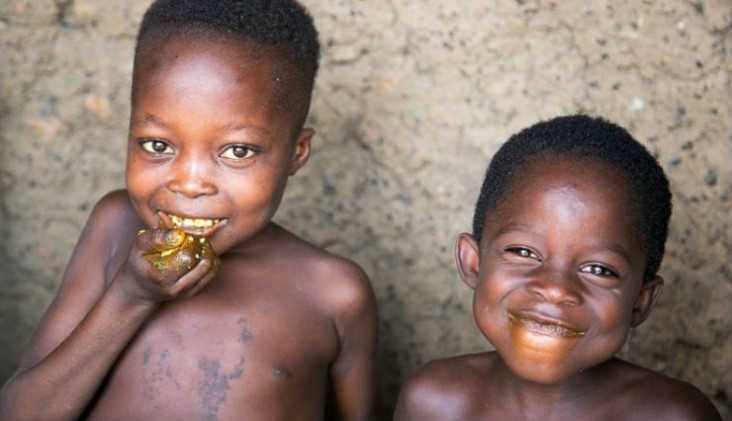
Food for Peace supports Ebola recovery in Guinea, Liberia and Sierra Leone through emergency food assistance that meets the basic food needs of families most affected by Ebola. This market-based response helps to restore households’ purchasing power, promotes market recovery, and encourages the resumption of trade and production of food.
Background
Numbers at a Glance
1.3
$102
15 | 14 | 14
The Ebola outbreak devastated lives and livelihoods in some of the most vulnerable countries in the world, Guinea, Liberia, and Sierra Leone. In the midst of the outbreak, another less visible crisis arose – a food emergency. With borders closed and movement restricted due to quarantines, people were prevented from traveling to work and participating in trade. As a result, many lost their jobs and were not able to cultivate their land. At the same time, since traders could not bring food to local markets, food prices rose, households purchasing power decreased, and markets dried up. With limited movement and decreased access to food, combined with Ebola’s impact on household livelihoods, food security in all three Ebola-affected countries rapidly declined.
What We're Doing
USAID’s Office of Food for Peace (FFP) works with partners to reduce hunger and malnutrition among the world’s most vulnerable populations. FFP’s goal is to ensure that all people at all times have access to sufficient food for a healthy and productive life. FFP provides emergency food assistance to those affected by conflict, natural disasters and other crises and provides development food assistance to address the underlying causes of hunger. During an emergency response like Ebola, FFP uses a variety of approaches to ensure that vulnerable people have access to the food they need; including using locally or regionally purchased food for direct distribution, cash transfers, food vouchers, as well as U.S. sourced in-kind food assistance. FFP aims to help households affected by crisis to meet their immediate food needs while sowing the seeds for community recovery through interventions that help communities rebuild livelihoods and better prepare for future shocks.
In the Ebola context, FFP helped to stop the spread of Ebola by partnering with the United Nations World Food Program (WFP) to provide emergency in-kind food assistance to individuals, households, and communities directly affected by Ebola – particularly those in quarantine.
To support recovery from the economic crisis caused by Ebola in Guinea, Liberia, and Sierra Leone, FFP partners with Non-Governmental Organizations (NGOs) to address acute food insecurity among vulnerable populations, including those directly and indirectly affected by Ebola, using a market-based approach that restores household purchasing power, promotes the recovery of markets and trade, and supports agricultural production.
FFP’s NGO partners target over 600,000 people with cash transfers, food and agricultural vouchers to address food insecurity and to provide livelihood support. These programs also include a variety of activities such as community asset building (e.g. road improvements and construction), supporting the resumption of community savings and loan schemes, providing market recovery grants to small traders to replenish their food stocks, treating children at risk of moderate acute malnutrition, and agricultural and livelihood fairs.
Results
Since the beginning of the Ebola outbreak, USAID, through FFP, has provided emergency food assistance to over 1.3 million people in Guinea, Liberia, and Sierra Leone.
In Liberia:
- USAID has provided food assistance to about 620,000 people in 15 counties since the outbreak began.
- We continue to partner with WFP to provide more than 273,000 school children with daily hot meals.
- We also partner with WFP to provide assistance to approximately 17,000 Ivorian refugees living in three camps who were could not return to Cote d’Ivoire due to Ebola-related border closures.
- We support UNICEF in providing therapeutic food to 10,400 children to treat acute malnutrition.
In Sierra Leone:
- USAID has provided food assistance to more than 340,000 people in 14 districts since the outbreak began.
- We support UNICEF in providing therapeutic food to nearly 9,000 children to treat acute malnutrition.
- Between April-June 2016, FFP NGO partners disbursed over $1.6 million into local economies through cash transfers.
In Guinea:
- USAID has provided food assistance to more than 240,000 people in 14 prefectures since the outbreak began.
- We support WFP to provide daily hot meals to about 136,000 school children.
- We partner with UNICEF to provide therapeutic food to 35,000 children to treat acute malnutrition.







Comment
Make a general inquiry or suggest an improvement.